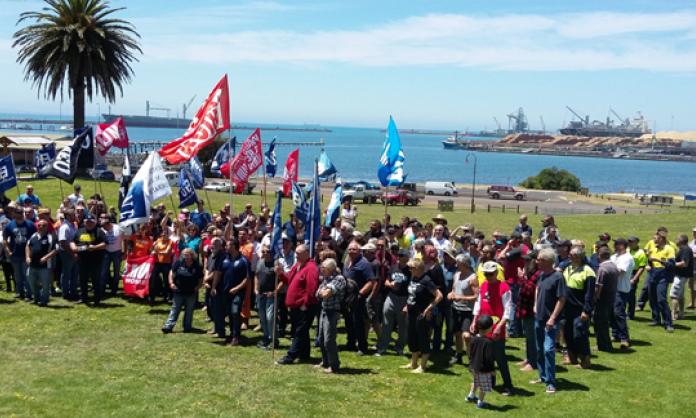Since the middle of November, the crew of the MV Portland have been staging a dramatic protest to defend their jobs, and hard-won wages and conditions, in Australia’s coastal shipping industry. Around 200 unionists and community supporters rallied in support of the crew in the western Victorian city of Portland on 4 December, as Jerome Small reports.
----------
For 28 years, the Portland has carried alumina from Alcoa’s mines and refinery in Western Australia to its aluminium smelting plant in Portland. In early November, the crew were getting ready to depart from West Australia when one of the crew’s partners emailed them a photo of the front page of the Portland Observer.
The newspaper reported that the crew were about to be sacked. Alcoa had arranged for an overseas-flagged ship to take over the Kwinana-Portland run. This would allow the company to employ crew members on as little as $2 an hour – a wage cut of more than 90 percent compared to the minimum standards that apply under Australian industrial law.
The company refused to confirm or deny the report. Ten minutes after setting sail from Kwinana, however, the crew were told that the Portland Observer report was correct: they were carrying their last load. The directive was to unload in Portland and then sail the ship to Singapore, where the ship would be sold.
“Then that’s it, they’re sacked, their job is finished”, explained Brendan McMahon, the former president of the South West Trades and Labor Council, speaking to Red Flag. “These guys got here and basically refused to sail the boat any further.”
The seafarers and their union – the Maritime Union of Australia – set up a protest camp next to the Portland harbour, a five-hour drive from Melbourne. They have been there since, the MV Portland too, despite the Fair Work Commission issuing an order that it be sailed to Singapore.
For the first week of the protest, the Portland was tied up at the wharf for Alcoa’s smelter. The ship has now been moved to another wharf in the harbour. On the day of the protest, the ship replacing the Portland, the Singapore-registered Strategic Alliance, docked for the first time at the Alcoa wharf and was discharging its alumina load. For the job, International Transport Federation inspectors report that its crew are each being paid about $200 a week.
“Alcoa wants to get rid of the ship [Portland], get rid of the crew, bring in a foreign crew just because it’s cheaper”, Dale Eaton explained. Dale is a crew member on the Portland and delegate for the Maritime Union of Australia. “They say it’s going to save them up to about $6 million a year”, he explains, “but the fact that they make $268 million a year shows it’s a bit measly. It’s a money grab, purely a money grab”.
Smelting aluminium can be a lucrative business. This is partly due to hefty government subsidies provided to the giant companies that dominate the industry. In Victoria, government handouts to Alcoa by way of cut price electricity have totalled between $4.5 billion and and $6 billion over the past few decades, according to a 2009 analysis by the Age newspaper.
Some of the smelter workers who talk with Red Flag at the protest mention the subsidies with bitterness. “If you’re going to try and get workers on 2 bucks an hour and you’ve been subsidised for 30 years, what are you actually trying to achieve here?”
Part of what the company is trying to achieve, it seems, is political pressure. As Brendan McMahon explained, Alcoa’s current electricity subsidy is due for renegotiation early in 2016. The company has an interest in “running the doom and gloom line” to put pressure on ahead of the renegotiation.
“That’s what they’re saying with this boat – they’re saying they’ve only contracted this other boat [Strategic Alliance] until October next year. They have put the frighteners on the town. ‘If we don’t get what we want, we’ll take our bat and ball and go home.’”
The Strategic Alliance is operating under a 12-month temporary permit issued by the federal government, another nail in the coffin of the local shipping industry.
There are currently 15 Australian flagged ships working on the coast, under Australian industrial law. “When she goes”, Dale Eaton said, pointing to the Portland, “there’s only 14 Australian flagged ships left on the coast”. That’s half the number there were a decade ago.
The alumina run from Kwinana to Portland is part of an industrial process that happens wholly within Australia. Bauxite is mined in Western Australia and refined into alumina in Kwinana, south of Perth. The alumina is then shipped to Portland for smelting into aluminium ingots.
Australian industrial law applies to every part of this process – with the exception, now, of the shipping. The federal government’s temporary permit means that much lower international minimums apply.
“It’s a disgusting thing, because it’s not monitored”, said Dale, talking about the exploitation of foreign seafarers that is endemic in the industry. “Because they’re not Australian, they’re not under our law, they get exploited to the max.”
The disappearance of local jobs is obviously a big concern for these workers, and the attack on long-established conditions equally so. “It’s not a thing about foreigners”, one smelter worker said, “it’s a thing about our working standards. People come here and that’s fine. [But] you work to a standard that we fought for 160 years ago, and we gotta maintain that.
“It’s a hard one because we all need jobs and a lot of jobs in Portland revolve around the smelter. It’s a small town, 10,000 people. If it goes under we’re in trouble, but when they cross the line into this sort of stuff, what do you do?”











